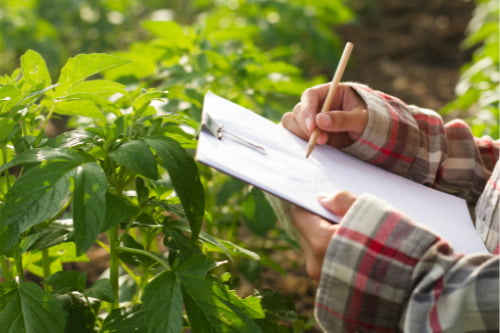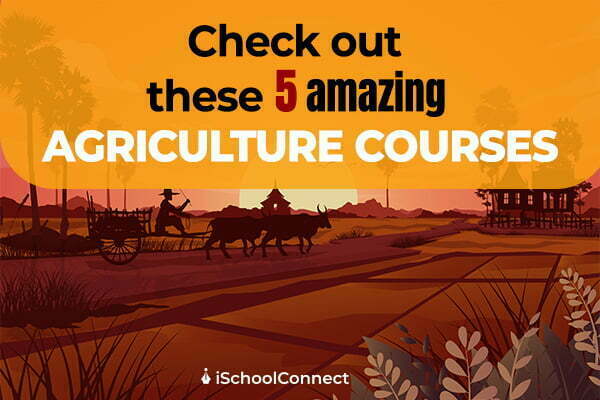Table of Contents
What is an agriculture course?
Agriculture is more than simply farming; it encompasses a wide range of themes and sectors, from forestry and animal science to conservation and food production. It’s a topic of crucial issues that the world faces since it deals with addressing the world’s growing demands of food and other produce.
The Agriculture course on a global level helps you get a bird’s eye view to look at the farming concerns and the exposure to diverse growing aspects. This might help you better understand the issues affecting global agriculture, which can help you with an edge over the other employees.
Scope of Agriculture courses

Agriculture is turning out to be a highly rewarding subject due to the increasing scope of dependence on sustainable energy as well as the growth of demand for crops and other produce. The student will have a variety of work prospects after completing their studies in this sector.
This course prepares students for careers in Horticulture, Plant Pathology, Food Science, Dairy Science, Plant Science, Agricultural Biotechnology, Fisheries Science, Forestry, and other related fields.
Agriculture Engineers, Nursery Florists, Horticulture, Food Scientists, Food Critics, Wildlife Biologists, Farm Managers, Water, and Wastewater Engineers, Environmental Engineers, Water Resource Specialists, and others develop important skills and knowledge after completing their education in this field.
The field of Agriculture is one of the many industries in India that has been rapidly growing in recent years. Agriculture provides a wide range of career options for students opting for a bachelor’s course is how you can get your foot in the door.
- Bachelor of Agriculture courses are recommended for students who want to pursue a full-time degree. Students who want to pursue a long-term profession and devote full time to their studies select bachelors or undergraduate courses.
- The duration of a bachelor’s course is 3 to 4 years.
- You can opt for a general or a specialized bachelor’s course.
- Admission to most institutions is accomplished through state and national entrance tests. This entrance procedure is usually determined by the institutes.
- Bachelor’s degree programs give a solid foundation for students who want to opt for further studies.
The Bachelor’s agriculture courses list include –
- Plant Science
- Dairy Science
- Plant Pathology
- Horticulture
- B.E. or B.Tech in Dairy Technology
- BBA in Agriculture Management and others
Master’s in Agriculture courses
Students who want to specialize further after earning their bachelor’s degree can opt for the master’s agriculture courses.
- The duration of the Postgraduate agriculture program is 2 years.
- Students’ knowledge and abilities in a particular specialization are enhanced with a master’s degree.
- Just like a bachelor’s course, the criteria for eligibility for a post-graduate course in agriculture are also determined by the institute.
The agriculture courses list for the Master’s course include –
- Agricultural Biotechnology
- Fisheries Science
- Plant Science
- M.E. or M.Tech in Dairy Technology
- M.E or M.Tech in Agriculture Engineering
- MBA in Agriculture management and other Master’s courses
Agriculture online courses
Certificate programs in agriculture are available in both online and offline formats. Online certificate courses are becoming increasingly popular, as they help you learn at your own pace along with other benefits. They are also updated regularly to keep up with the latest trends. The duration of such courses lasts from some hours to a couple of months.
The major goal of the certificate program is to keep students up to speed on the latest trends and developments in their chosen field. Certificate courses bring students up to date with changing technology and resources.
Certificate programs can also benefit those who are currently working and want to expand their skills in the agriculture area.
The Agriculture online courses have the benefit of having flexible hours that do not interfere with your everyday routine.
The classes are available all around the world via video and voice communication. The following organizations offer online agricultural certificate courses.
- Sustainable agricultural land management – Coursera by University of Florida
- Agriculture, economics, and nature – Coursera by University of Western Australia
- The transformation of global food system – Coursera by University of Copenhagen
- Bio-organic farming & gardening: grow your food – Udemy
- Modern farming techniques – Udemy
The entrance exams
Depending on the college, admission to Bachelor of Agriculture programs is done on a merit or entry basis.
ICAR Admission Examination (ICAR AIEEA), TS EAMCET, MP PAT, JCECE, AP EAMCET, and PAU CET are some of the major entrance examinations for UG Agriculture programs like BSc.
ICAR AIEEA, MH CET, GCET, TS EAMCET, KCET, BCECE, and BHU Entrance Examination are the entrance tests for BTech admission.
Students taking the admission test must have completed 10+2 from a recognized board with a minimum of 50% in the aggregate.

What do we have to say?
As the applications and the need for people to rely on the agricultural sector grows, so do the rates of employment. The rates of employment continue to expand because of the specializations that cater to various specific areas of agriculture. This eventually leads to a detailed approach to solving these problems and improving the processes.
FAQ’s
Q1. Can you learn Agriculture courses online?
Answer – There are several online platforms where you may learn and practice Agriculture courses for free or for a fee at the certificate, diploma, and post-graduate diploma levels. Udemy, Coursera, edX, and FutureLearn are some of the most popular online course platforms. These schools do not require an admission exam and are entirely dependent on a student’s merit score in class 10th or 12th.
Q2. Can you opt for agriculture courses after the 12th?
Answer – Yes, there are multiple courses and diplomas available for the agriculture courses.
Q3. What are the highest paying jobs in agriculture?
Answer – The highest paying jobs in agriculture include –
- Farm manager
- Water resources engineer
- Water treatment specialist
- Environmental scientist
- Food technologist






